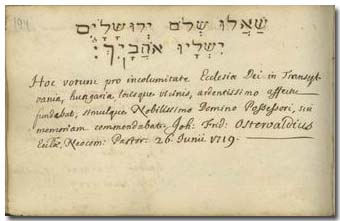

Hoc votum pro incolumitate Ecclesiae Dei in Transylvania,
hungaria, locisque vicinis, ardentissimo affectu fundabat,
simulque Nobilissimo Domino Possessori, sui memoriam commendabat.
Joh[ann] Frid[ericus] Ostervaldius Ecclesiae Neocom[ensis] Pastor.
26. Junii 1719.
|
* Ps 122:6: Sha'alu shelom yerushalayim
/ yishlayu 'ohavayikh: Vulgata: “Rogate quae ad pacem sunt
Hierusalem et abundantia diligentibus te.” This
quotation differs from the Masoretic text at some points: 1)
In the manuscript the diacritic point is missing from every
shin but the first one.
2) The Masoretic text includes an incomplete, so-called
ketib form of the word Yerushalayim:

(yerushalam), while the manuscript the readable form,
the so-called qeri. 3)
Ostervald adopted an ingenious "double punctuation" in the
third word of the first verse, not used in the Masoretic text.
The qamec (a) under the lamed of yerushalayim is
followed by a holem (o) above the lamed, thus suggesting an
alternative reading of yeru-shalom, where the second
half of the word equals to the Hebrew shalom = ‘peace’.
|
|
|
Pray for the peace of Jerusalem; they shall prosper that love thee. *
With this prayer I obsecrate for the safety of
the Church of God in Transylvania, Hungary and the nearby regions;
and I recommend myself into the memory of the noble owner [of this
album]. Jean Frédéric Ostervald, pastor of the church of
Neuchâtel, June 26, 1719
|
p.
194. Neuchâtel, June 26, 1719
Ostervald, Jean Frédéric
(1663-1747), Swiss Reformed
theologian
Jean Frédéric Ostervald (Osterwald ) was born in Neuchâtel
(Neuenburg) on November 25, 1663 in a patrician family, a son of
the Reformed pastor Johann
Rudolf Osterwald. He studied in Zürich, Neuchâtel and in Saumur;
he obtained magisterial grade in 1679. Then he read theology in
Orléans and Paris; then he returned home, but soon he left again
for Geneva and Dauphiné. Finally he graduated in Neuchâtel in
1683. Here he spent the most part of his life, first as a diacon,
then from 1699 a pastor, and finally he was elected deacon.
Besides this he gave lectures at the academy of theology. In
August 1746 he had a stroke in the pulpit. He died in Neuchâtel on
April 14, 1747, after 61 years of service. His pastor's office was
inherited by his son Jean Rodolphe (1687-1764). His grandson was
the historian and geographer Samuel Frédéric
(1713-1795), whose geographical works were translated into
Hungarian by István Losonczi of Hányok (1709-1780). Since 1699
Jean Frédéric Ostervald worked on a complete reform of the
Reformed church. First he was influenced by the English version of
Arminianism ((Jacobus Arminius, 1560-1609), the five articles of
faith of Dutch Remonstrants (Remonstrantia,
1610) touching the questions of faith, repentance, grace, human
will and universal salvation, by mitigating Calvinist
predestination. The Synod of Dordrecht (1618-19), however, has
seen the victory of orthodoxy. Ostervald made a step forward, and,
together with his two companions in the "Swiss triumvirate" –
Jean Alphonse Turrettini of Geneva, and Samuel Werenfels
(1657-1740) of Basel – he tried to save the Reformed church from a
new dogmatism. His innovative proposals embraced dogmatics,
exegesis (his important translation of and commentary on the
Bible), liturgy (Bible reading instead of preaching), himnology
and moral theology (importance of good deeds and moral life). His
writings had a great influence, bearing spiritual renewal or
exploding contests among Valdenses, Dutch, German, Hungarian and
Scandinavian protestants. Moreover, the English Royal Society for
the Propagation of the Gospel in Foreign Parts – of which he was a
member – brought his teachings to the countries of the Middle
East, India, Canada and the West-Indian Islands. His highly
influential oeuvre was later called “the second Reformation”. Some
of his works – especially his catechism – were published in
several languages (among them in Hungarian), discussed and
debated. His diary was also published in 1849. Some of his works: Thes. de rerum naturalium
principiis, Saumur, 1679. – Traité des sources de la
corruption qui regne aujourd'huy parmi les chrétiens.
Amsterdam, Neuchâtel, 1700. A’ keresztyének között ez idő
szerént uralkodó romlottságnak kútfejeiről való elmélkedés …
Debrecen, 1745. – Catéchisme ou instruction dans la religion
chrétienne. Genf, 1702. Katekhismus, vagy a keresztény
vallásban való oktatás, mellyet … magyar nyelven ki-adott
Kármán Jósef. Pozsony, 1789. – Traité contre l'impureté.
Amsterdam, 1707. Neuchâtel, 1708. – La Liturgie, ou la manière
de célébrer le service divin … Basel, 1713. –
Considérations sur la réunion des protestans … traduites de
l'allemand de Mr. Werenfels. 1716. – Ethicae Christianae
compendium, 2nd ed.: Basel, 1739.
Jean Alphonse Turrettini, the other member of the
“Swiss triumvirate” wrote his note in the album of Pápai Páriz a
week earlier, on June 19, 1719 (p. 249).
•
Jöcher • Jöcher-Adelung • Michaud • Petrik II 953 • SchwL |

